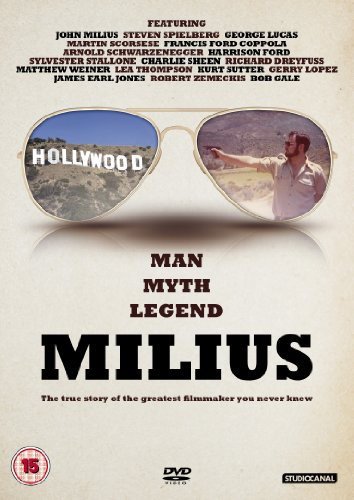
For a man who has had many triumphs, John Milius is seen as a tragic figure – he’s the one who couldn’t adapt to the corporate takeover of Hollywood in the ’80s. He’s the one that flamed out with Red Dawn, which might have been financially successful (which is hard to gauge from my meager research, but a cursory examination at BoxOfficeMojo.com shows it was the 20th highest grossing movie of the year, and the top grossing PG-13 film) but it was controversial, and proved just too-Milius for Hollywood.
Much of this documentary is centered on the notion that Milius just didn’t fit in (or really want to fit in), politically, and when his politics became obvious in his films, they made him if not box-office poison, then kind of socially unacceptable. It’s interesting, the amount of time that is spent in this fine biography of Milius trying to suss out exactly what his politics were – again and again, his apparent Republicanism is dismissed as a personality affectation. The notion is brought up that “supposedly” right-wing attitudes might be a handicap in Hollywood. The lack of self-consciousness about this salient fact is notable – the film goes right from Sylvester Stallone and Arnold Schwarzenegger talking skeptically about this unofficial blacklist to George Lucas saying, in effect, “but Milius is such a nice guy in person.” As if being a Republican and being a nice guy were contradictory. As if the documentary was inadvertently tipping the hand of the filmmakers and the community at large that, despite what you might have heard about Milius’ right-wing leanings, that he wasn’t that bad. They dismiss the prejudice, and then invoke it in the very next sentence.
But look at the names involved: Lucas, Stallone, Schwarzenegger. Steven Spielberg is also prominently featured, as is Francis Ford Coppola, editor Walter Murch and other luminaries of the West Coast enfant terribles of the ’70s. From our vantage point, the notion of placing John Milius in the august company of the men who reinvented the film business in the late ’70s seems strange. Milius, the new documentary showing on Epix, makes the compelling case that John Milius was not only the boldest and brashest of the early film school set, but that he enabled (or at least assisted) the careers of many of those who have gone to be the biggest filmmakers in Hollywood.
Told through talking-head interviews (occasionally interspersed with words from Milius himself, from a 2004 interview and from some older recordings and footage), this film traces the man’s biography, from his beginnings in the Midwest to his subsequent relocation to California, both where he lived and where he developed his personality, as a surfer and raconteur. Milius idolized masculine pursuits and, as his own words make clear, wanted nothing more than to fight and (hopefully) die in battle. Asthma washed him out of the military, and all of his subsequent career was an attempt to make meaningful a life that could not be given in war.
So that masculine, powerful energy, the strength of a man denied his dream, went into his writing. He was responsible for numerous moments of ’70s cinema that people actually remember. Jaws, Dirty Harry, Apocalypse Now – those are the movies people might still watch on purpose. It is only through the cajoling of cineastes that one might take the time to see McCabe and Mrs. Miller, or Five Easy Pieces, or The Last Detail (which is not a reflection on the quality or importance of the movies, but though they may be iconic representations of ’70s cinema, they are icons only in the cinematic world, while Dirty Harry is an icon in the much broader popular culture). The movies Milius helped make great are still in-demand from viewers, not as artifacts of a time (golden age of cinema or not) but of current, relevant pieces of entertainment.
And through it all, through all the archive footage and the interviews about John, it becomes strange that we haven’t heard directly from him, to answer the direct questions of the documentarians. It’s especially odd to have interviews with his children, talking about what he might have wanted. It gives Milius the sense of being past tense. Then the doc explains his peculiar silence: John Milius had a stroke. According to the semi-reliable IMDB trivia page, he had it on the week he was supposed to be interviewed for this film.
I debated whether or not to bring it up, since it amounts, I suppose, to a spoiler, though a spoiler for documented events seems absurd, and the fourth item in Google’s autocomplete is “John Milius Stroke”. The filmmakers have discussed it in interviews; it’s on the man’s wikipedia page. John Milius had a stroke, a terrible stroke that left the raconteur incapable of speech. It moves the man’s story from self-inflicted tragedy to the blameless, heartbreaking variety. He is shown in recovery, walking, shooting, coming close to talking, but it’s unlikely his long dreamt-of Ghengis Khan project will take off, at least not with him as director.
As for Milius the film, it gives as complete a picture of a man as you can get (at least in 100 minutes, and without being able to talk to the man himself.) It has some cute animations (all documentaries seem to, these days) and plenty of fine interviews. It is not groundbreaking visually or structurally, which is probably a plus since it keeps the focus where it belongs, on its subject. And John Milius is an engaging subject. If only they had scheduled his interview a week, or just a few days earlier, it might have taken the show to another level.